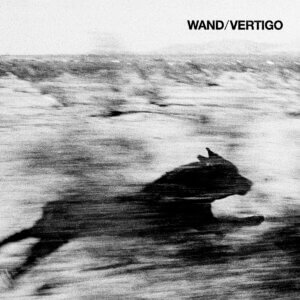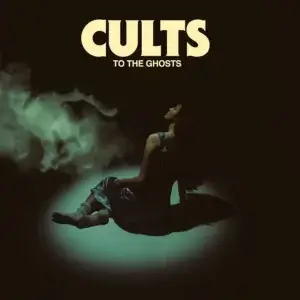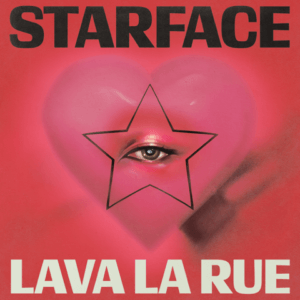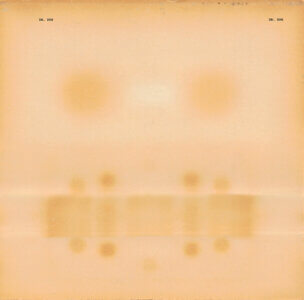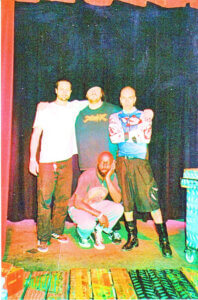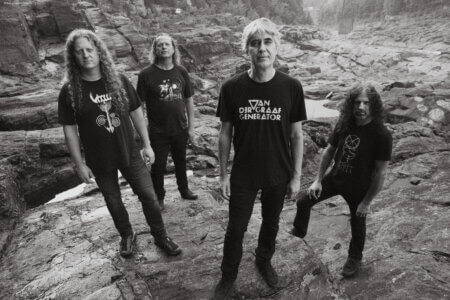At The Gates embrace their progressive side
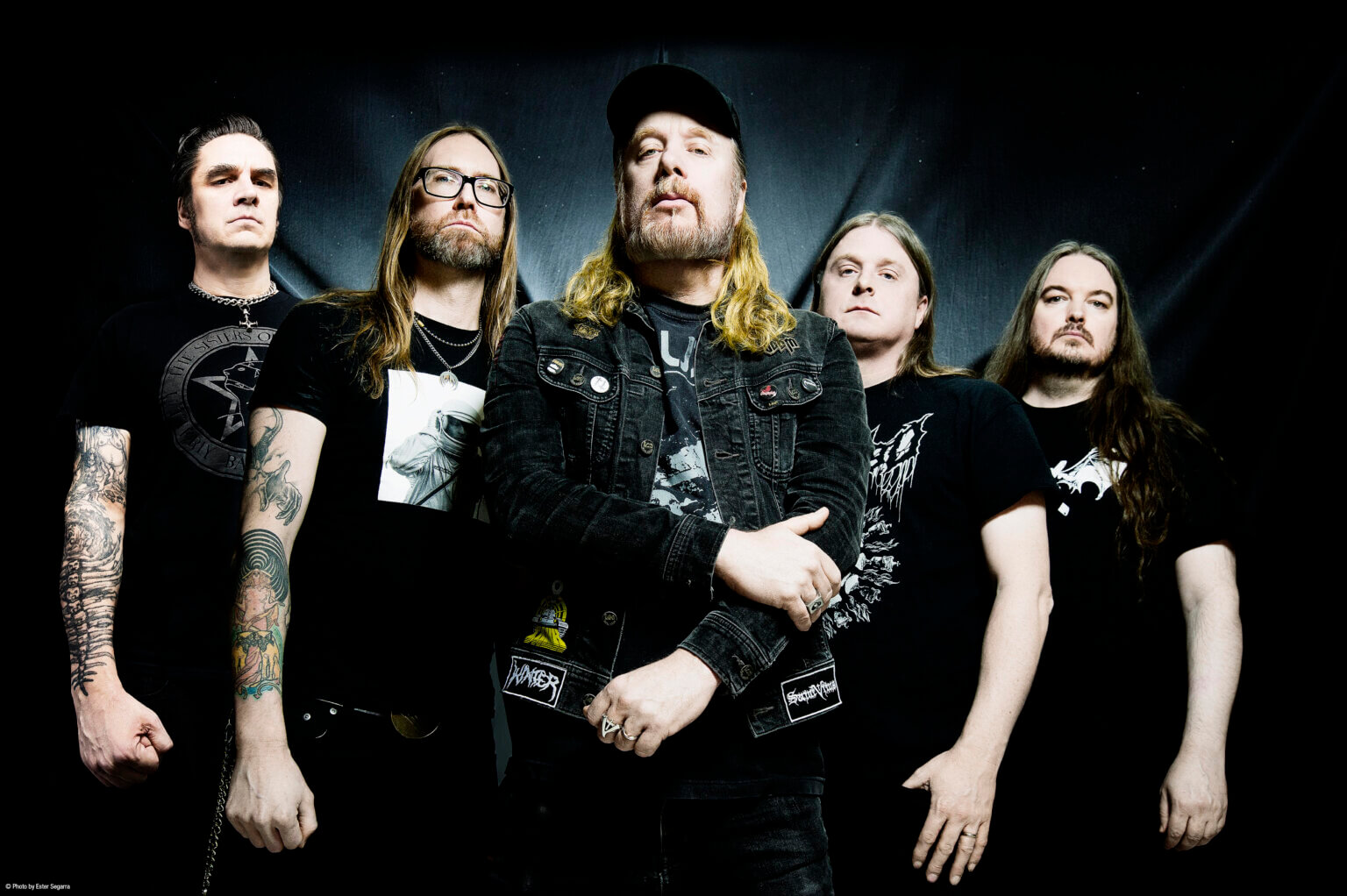
For metal fans, At The Gates need no introduction. They are one of the most important bands to emerge from the Swedish death metal scene. Formed out of the ashes of late 80s death metal band Grotesque, the band were trailblazers right from the start with their excellent debut album The Red in the Sky is Ours. A raw and dark album with unique guitar riffs and melodies that truly stood out from their peers. In 1995 they released the incredibly influential Slaughter of the Soul, widely considered to be one of the greatest melodic death metal albums of all time. Fast forward to 2021 and the band is set to release what is possibly their most daring record yet. Fusing their death metal sound with progressive elements and poetic lyrics, The Nightmare of Being is another standout in the band’s catalogue. Jahmeel Russell spoke to vocalist Tomas Lindberg about the writing and production of the new album and the history of the metal scene in Sweden.
Northern Transmissions: How did you end up deciding on Andy La Rocque and Jens Bogren to work on the album?
Tomas Lindberg: I think we wanted someone with a great meticulous mind. Very structured and attentive to details. We also knew we wanted to use a lot of different studios for the different instruments to bring them to life. So you know, the guitarist could shine, recording with Andy La Rocque, for example, but then we needed Jens spider in the web to make it happen. We had a lot of discussions with him before about it, like which direction to go sound-wise. We didn’t want it as sharp and modern as At War With Reality, we wanted something more progressive, more analog sounding. We have a lot of non-electrical instruments on the record, and to make them blend with the music, you need to create an atmosphere that is ready for this complex music. Having Jens was a perfect choice for that.
NT: Did Andy or Jens get involved in the arrangements of the songs or were their contributions mainly on the sonic side?
TL: Not really. We had pretty meticulous demos made before. There were moments where they gave us advice, when there’s so much going on at the same time, how do we make everything audible at the same time and enjoyable for the listener? Small stuff like that they could help us with but that’s also why we brought them in.
NT: Was their approach to capturing the material much different than Russ Russell’s? (Producer of 2018s To Drink From The Night Itself)?
TL: Not really. The production is a lot of work and for To Drink From The Night Itself, If we hadn’t said to Russ, this is what we’re after, he could have made that sound as crisp and clear as (2014s) At War With Reality, because it’s recorded in a way that it could be that like that. We demanded it to have a gritty or dirty production. Russ and Jens are the same level producer-wise, but if he would have made his own mind up, it probably would have had much clearer production. Honestly, not many people know this, but before At War With Reality, we actually had a little test. We gave one demo song, Eater of Gods, to eight different producers. (Guitarist) Anders (Björler) was the only one who knew which one was which and they made a blind test for us. Russ and Jens got exactly the same points for that one. They were way ahead of everybody else. The fact that Jens did At War With Reality, basically it could have been either one of them, but Russ was unavailable for the time period we wanted. That’s why we wanted to work with him on To Drink From The Night Itself because he was very close with Jens on that competition, so they are both equal for us.
NT: What an incredible opportunity to even be able to do that, to sort of shop producers.
TL: I mean, I don’t know if it can happen again. At War With Reality was like a one-time thing, the comeback record. A lot of people wanted to produce as well. As far as the other six people go, that’s a secret because if they didn’t get the job, they wouldn’t be happy. Some other version of Eater of Gods might pop up as an extra on something. Some are really cool, but not what we were after right then.
NT: As far as Andy’s role was concerned, he was very focused on just guitars and bass then?
TL: Yeah, exactly. Jens was focused on the whole album but he said very early on if you’re going to do this multiple studios thing, he wanted to be in control of the drums. He’s very meticulous when it comes to drum recording because drums you can’t really change that much afterwards. So he was adamant about doing the drums in Stockholm. I’m very comfortable with Per (Stålberg) here in Gothenburg for the vocals because it’s not so much about different microphones or desks or stuff like that. Anyone could technically record vocals I guess but you need someone who understands the vocalist. It’s more the atmosphere you’re after. As far as the more classical instruments, they need a different ambience, different studio to be for them to be recorded in a good way. Audible.
NT: Were you and Jonas (Björler) the primary writers again on this album?
TL: Yeah, it happened that way. We always invite everybody. We thought (guitarist Jonas) Stålhammar would come up with more for this record because he’s a very prominent songwriter in all his other projects. I think it does take some time for a person to adjust to a band with a long history to kind of realize how we write songs and what exactly the At The Gates sound is. Everything was written on To Drink From The Night Itself before he joined so he didn’t have any time to adjust then. When we started waiting for this album, I think he’d been in the band for two years and it sounds like a lot of time, but it takes time to dig into it. I know he has a lot of ideas, he just needs to figure out how to approach it the At The Gates way. On the other hand, Jonas and I probably had him in mind as a guitar player, when we wrote a lot of the tracks because of his playing style. You write for the players to get the most out of them as well. For a song like Garden of Cyrus for example, I know he was the one that was most excited about that song. It’s right down his alley playing style-wise. He and Anders (Björler) are two different persons two different guitar players, but in that department, Stålhammar shines more. With Jonas, he can write a song with five riffs and I’ll say four of these are shit, put them away, this is the main riff, and he’s like, cool and he works with that. We’ve known each other since we were 16. So we can do that.
NT: The saxophone on Garden Of Cyrus sounds incredible in the song and adds another dimension to the album. Was it something you decided to try in the studio or did you always have it in mind when you were composing the song?
TL: On the first demo version there was no space for it, we didn’t have it in the back of our heads, but because we could revisit songs again and again, let it rest for a month and then go back. We talked about it needing more desperation, and what’s the most desperate tone you can have? A saxophone. I was listening heavily to jazz and Jonas is a big King Crimson fan, we all are, and it really fit. We got in touch with Anders (Gabrielson), and he knew what we wanted. He has a master’s in improvisational jazz on saxophone from the university. So it’s a totally different league of playing. He was in there for 15 minutes in the studio. That’s basically the first take you hear on the album. It’s cool to work with people like that. It makes you humble. Also, it adds layers that you couldn’t add yourself. He doesn’t take on our artistic outlet. He’s like, this is what I see. We could never come up with that. So that’s amazing. I think for us also it was the idea to make a marriage between improvised music and very strict music, which metal is, and how would that affect the music? We were really intrigued by it and maybe it’s something we’ll pursue further, who knows?
NT: The Fall Into Time has some beautiful orchestration and some parts that also have a jazzy feel. Is the songwriting process different when compared to composing some of the more straight-up aggressive material on the album?
TL: Well, on this record, I would say not in one way. We kind of know where we want to take the song. Then it’s the hard work, trying to get there, getting the right emotional aspect of the song. Some of the more classical At The Gates songs like The Paradox, for example. It has so many details and layers and solos and parts that we couldn’t have written in 95. We were not proficient enough to do that. So what we call normal At The Gates has also evolved a lot, so we take it to a different level there as well. I think it’s the same hard work, but The Fall Into Time was basically just like the whole intro part. That was Jonas’s first idea. We had that lying around for quite a while. Then we had that more progressive part. We call it the Wishbone Ash part, the proggy jazzy thing in the middle. We were like, “should we build a real epic kind of anthem out of all of this?” We were intrigued by the idea, but it took a lot of hard work to piece it together.
NT: It sounds so cinematic and huge, especially when you compare it to The Red in the Sky is Ours. You had a violin on that record, but it’s very stripped down and almost raw sounding compared to what you’ve got going on this new record.
TL: I mean, that’s it. That’s the evolution of the band. I think that we have matured as we’ve done so much songwriting since then. We know how to build the song better now, it should have a flow. Back then it just happened. Youthful arrogance and naivety, I guess but maturity counts for something. We really wanted, as you said, a cinematic aspect to the album, and with the cover as well, to build a little world you can go into almost when you listen to the record. So it’s like you forget about the rest, you’re in that zone for the duration of the record.
NT: Do you ever worry that you might alienate some fans who are hoping to hear another album like Slaughter of the Soul?
TL: I mean at one point we probably did. Like with At War With Reality, we probably thought about it a little bit when we came back. But since we managed to do that successfully and also To Drink From The Night Itself, we’ve had a little bit more experimentation on it. We felt we can build a listener base that is as curious as we are. In my mind, I hope they want to be challenged by a new At The Gates record, as we want to be challenged when we write the music. If they wouldn’t be maybe that would be almost a disappointment. If we did Slaughter of the Soul part two, the people who are always crying for Slaughter of the Soul part two would be disappointed, no matter how good that record would be. It could be Slaughter of the Soul but better and it would still be not as good because they have an emotional relationship with that record and I get that. I have the same with bands I like you know. I honestly understand, like an album from 2010 from a band that was popular in the 80s might be better but I still think the old one is better because I have nostalgic reasons. That’s how it works with music. You can’t satisfy those people anyway. So then we satisfy the ones we can I guess. I think what counts is even on a song like Garden of Cyrus, The Fall Into Time, or Cosmic Pessimism on this record. If you play them for any metalhead and say “okay, this is a metal band playing this, which metal band is it?” I think most of them would say it’s At The Gates. The whole emotional landscape we paint. I think that’s what makes us At The Gates. We just try different instrumentation, try different arrangements. I hope people see that.
NT: Do you feel like you’ve turned a corner with this album? Do you think the band will continue to push its sound going forward?
TL: That’s the great thing with At The Gates. We don’t know before we start where it’s gonna take us. It could be like, ten hardcore punk songs on the next one, who knows? The thing we want to do is always to make it interesting for ourselves to write it. If you do that, you need to challenge yourself and go where you haven’t been before. Anyone could write an experimental album I think, but it takes a lot more work to do it within certain limitations. It’s should still sound like the band. That’s what makes it interesting for us I think. Of course, there’s a lot of parts here that in one or two years, we probably can do them even better and expand on them for sure but I wouldn’t be worried as an At The Gates listener. An At The Gates album will still be a death metal album whenever it comes out.
NT: Sweden has one of the greatest metal scenes in the world and has produced many great black and death metal bands. I think At The Gates has always sounded unique but I was wondering if bands from the early Stockholm scene like Nihilist and Morbid, or even your work in Grotesque was influential to the band when At The Gates was starting up?
TL: I mean, we were part of that scene. Sweden is a small country. It is still five hours with a car from Gothenburg to Stockholm but if you’re 16, 17 years old and you’re super dedicated to this underground genre, you’re very close to the people within that scene. Even if they’re from Stockholm, or wherever they’re from. So of course, we saw ourselves as one scene. We didn’t think of Gothenburg and Stockholm back then. So when At The Gates started, we had this idea that we wanted to make something a bit different within death metal, probably because of Grotesque because we kind of felt, we’ve done this to the limits. We can’t take it any further. So At The Gates was from the get-go, a no-boundaries kind of band. That’s what we wanted and I guess maybe that influenced the rest of the Gothenburg bands that came later. That you could do something that was not, and I don’t mean in a bad way, but like the Stockholm sound.
We were still hanging out with the Entombed and Dismember guys and all that. That was the scene. In my mind, we’re still there, most of the bands are still there, in one way or another, and we are still friends. So Sweden has always had this, since the early 80s, a very strong metal and hard rock scene. Always. I think it comes a lot from how society is built up here. We had a government that cared for culture, that provided youth centres, rehearsal spaces, grants for musicians, young and old. On TV or radio, there were always state-sponsored rock shows and hard rock shows and stuff. I think that’s why it’s such a great scene. Bands broke out like, everybody knows them from The Final Countdown but Europe, the first two records were hard rock records. They were super big in Sweden. The new wave of British heavy metal was everywhere in Sweden in the early 80s. That’s why we’ve got all this quality ranging from a band like Europe to Bathory, Entombed, Candlemass. All these different genres, but they come from the same scene. I think the only thing we didn’t really do was thrash metal was not put on the map by Sweden so much. We had two good bands, Agony and Mezzrow. They were the only two that released albums on big labels but that’s still a lot of big legacy for Swedish hard rock and metal I guess.
NT: Bathory is one of my favourite bands of all time. I mean, you can’t overstate how important Bathory is to heavy metal in general and obviously to black metal.
TL: Definitely. Quorthon was interviewed on national radio quite a few times back in those days. The first time you heard those interviews, that’s the first time you heard his voice talking. That was pretty cool. He was he so secretive on those first two records.
NT: Are there any bands in the Swedish scene you feel are overlooked and deserve more recognition?
TL: There’s always small cool bands of course. Gems here and there. I think (guitarist) Martin (Larsson)’s first death metal band House of Usher, people know about them a little bit. They’ve been on one compilation here and there but they were really good. You have breakout bands like Afflicted Convulsion before they were called just Afflicted and released records. That was a really progressive band for their age as well. Merciless of course, people know about Merciless, but they’re like the godfathers of a lot of stuff, you know? There’s a lot of stuff out there that might be overlooked. If you look to the new wave of Swedish heavy metal back in the early 80s, we have a lot of those bands like Mercy, Gotham City, a lot of really obscure, really cool, heavy metal bands from back in the days.
NT: We lost L-G Petrov from Entombed this past March. Do you have any memories of him you could share?
TL: I mean, there’s a lot, that’s the thing. Whenever people ask me about it you forget that he’s not there. I think the first time we will play Stockholm, and he won’t be backstage drinking our beer. That’s the first time I will realize that he’s not there and then, of course, there will be dedications to him. You know, it’s really hard. I’ve known the guy since 1986. That’s the first time I met him. The (pre-Entombed band) Nihilist went to Uppsala for this show and I was there too and L-G was there when he was still playing drums in Morbid. I was more friends with Uffe (Cederlund) and Nicke (Andersson). Those were the guys I tape traded with. We all lived at our parent’s houses so we used to go to each other on summer holidays and stuff like that. L-G was always there but the first time I saw Nihilist live they played Gothenburg and Grotesque was supporting them. We were just like messing around trying to figure out what we were doing but when they went on stage, that must have been their fourth or fifth show ever, they were 16 years old, and he commanded the stage at a youth club. I was like, that’s how you do it, you know? That will always be with me that he was such a great frontman and from the early days, such a great guy too. People probably remember him as this jovial, joking kind of guy always having a laugh, which is good as well, but he always listened to people. Even a cab driver or hotdog salesman, he would sit down. If they had a story, he would listen to them. That’s what people forget about him. He was one of the first from my gang. I lost people before within music. The Disfear bass player Henke (Frykman). Jon (Nödtveidt) from Dissection. Jesse (Pintado) from Napalm Death. People like that you know, but L-G was closer in the way he was one of us and he’s gone.
At The Gates new album, The Nightmare of Being is out July 2nd on Century Media Records
Latest Reviews
Tracks
Advertisement
Looking for something new to listen to?
Sign up to our all-new newsletter for top-notch reviews, news, videos and playlists.
